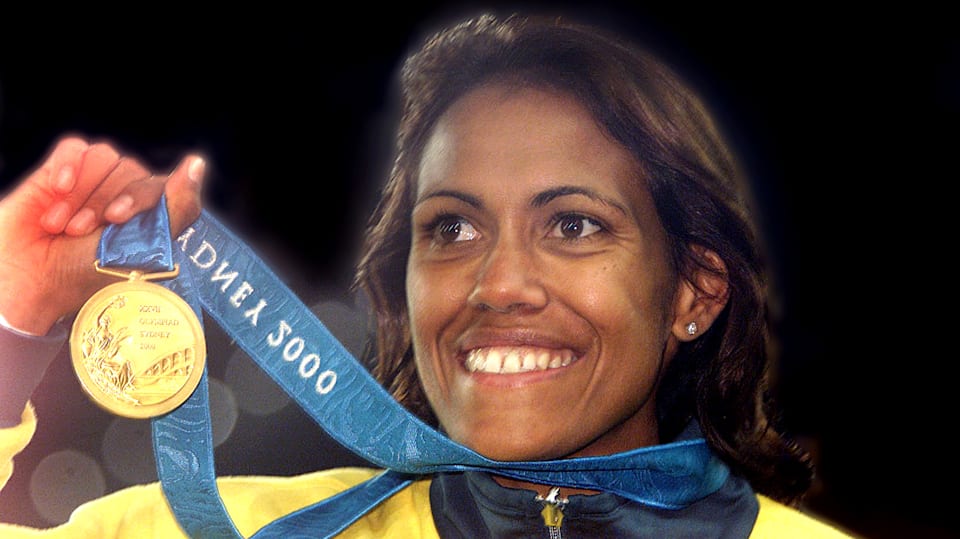Cathy Freeman re-lives Sydney 2000 gold that brought Australia together
"Those other girls were always going to have to come up against my ancestors," recalls runner who made history for her country and her Indigenous community.

"It just feels like a dream."
Even 20 years after she carried the hopes of a nation to win 400m Olympic gold in front of a raucous home crowd in Sydney, Cathy Freeman still can't quite believe what she achieved, and what her win meant for her country.
It was a turbulent time politically – Australia was trying to come to terms with its complicated history and relationship with Aboriginal, Islander, and Indigenous people.
As the most high profile Indigenous athlete, Freeman provided a gateway and a focus for changing race relations in the nation.
Now, she has re-lived everything surrounding the Sydney 2000 Games – her background, lighting the Olympic flame at the Opening Ceremony, and winning Olympic gold – in a new documentary about her life, FREEMAN, from Australian broadcaster ABC.
Childhood and racism
"When I think about that one night in September (winning Olympic gold), for me it takes me back to my very first race," Freeman said in the opening moments of the film. Running was "always - dare I say it - such a spiritual experience," she added.
It was her step-father who encouraged her early steps in athletics. Growing up, a young Freeman had on her wall the words 'I am the world's greatest athlete'.
But something else was evident: the way she was treated because of her skin colour.
"I was a kid who was quite embarrassed to be a black kid; an Indigenous kid. I grew up with that self-image," she said.
"I was about 10 or something and I had won my race, but I didn't get my trophy for it apparently because I was black."
She became Australia's first black Commonwealth Games champion in Auckland in 1990, but four years later in Victoria (Canada) would be reprimanded by team officials for celebrating with both the Australian and Aboriginal flags.
"I wanted to shout, 'Look at me. Look at ... my skin, I am black and I am the best there is," she said.
Reconciliation
Before the Sydney Games, hundreds of thousands of people had marched across the Sydney Harbour Bridge in solidarity and reconciliation with Aboriginal and Indigenous people, even as the Australian Government refused to apologise for historical wrongdoings, such as the forced removal of Indigenous children from their families.
Prime minister Kevin Rudd would eventually make an apology on behalf of the country in 2008.
The film explored Freeman's own family history and how her ancestors were discriminated against. Freeman reflected on how she ran not just for herself, but for her community. "I have always been very mindful of my ancestors," she said.
At the Games, Freeman was chosen to light the Olympic Cauldron during the Opening Ceremony. Not even her mother nor manager knew about this until she took centre stage at the Olympic Stadium.
It sent a powerful message of unity.
Rivalry and racing
But what really got Australia and Australians united behind her was the 400 metre competition. She had won silver at Atlanta 1996 in a new personal best time behind rival Marie-José Perec of France, and the competition between the two was meant to be the race to watch.
However, Perec abruptly withdrew from the Sydney Games just 24 hours before the start of the heats and flew home to Europe after being harassed by Australian journalists and reporting a break-in at her hotel.
"My heart dropped. My heart drops still, now," Freeman admitted. "I knew that I was up for it. She knew it and I knew it but we'll never know because it didn't happen."
The night of the final, she said, "I felt exceptionally light. I felt exceptionally loose. I felt good - 'it's just another day at the office, remember.'
"I'm feeling calm. I'm about to turn the corner to go out onto the track, and I remember somebody saying 'You can do it, Cathy!'
"As soon as I hear this person, everything becomes like a blur."
"I don't hear anyone. I just sense that I'm all alone, actually." she added, despite having nearly 120,000 people cheering her on in the stadium.
Victory
What followed was a masterful, yet meticulously-planned, race. In third rounding the final bend, Freeman accelerated, as per the strategy she had previously agreed on with coach Peter Fortune.
She recalled thinking: 'I can win this, I will win this, who's going to stop me?' However, winning gold wasn't quite enough.
"I looked straight across to the clock and I was disappointed with the time. I should have run under 49 (seconds) and I didn't."
But that didn't really matter. She had won gold for herself, her country, and her community, and united millions of people in the process.
Ultimately, Freeman thinks she was always going to have the upper hand in that final, running with a sense of higher power helping her.
"I feel like I am protected," she said. "Those other girls were always going to have to come up against my ancestors."
